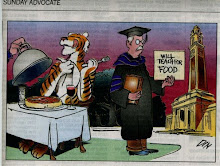What good is a room with a breathtaking view whose windows haven’t been washed in a decade? How useful are glasses with one shattered lens? How well can one drive without defogging his windshield on a cold day?
The ability to perceive through observation is innately human. We seek to satiate our desires to know and understand through investigating firsthand things that interest and matter to us.
Money undeniably satisfies both of those requirements. And as a price for living in a civilized society, we pay a sizeable chunk of our earnings in taxes (that are too high and too tediously complex, but I digress…). And because we contribute to the creation and maintenance of government projects, we should enjoy the right to examine how those dollars are being spent. When taxes are hardly voluntary (unless you are a crafty politician), should compulsory fees we pay to the government be spent by politicians and bureaucrats without any accountability?
Interestingly enough, LSU System President John Lombardi appeared all too eager to disclose the system’s expenditures on the aforementioned LaTRAC website. Unfortunately for taxpayers, many of us, when delving into each budgetary component’s intricacies, were met with three dirty words: “SUMMARY DATA ONLY.” This phrase signifies the budgetary roadblock of an inability to further investigate a spending category’s specifics.
Sure, Lombardi had no problem telling Louisiana taxpayers that he spent XXXXX on teachers’ salaries. However, disclosing each employee’s salary is left up to the scoop-seeking DAILY REVEILLE and THE TIMES PICAYUNE. And Lombardi had no problem releasing the figures for the egregious $1.8 million in teachers’ conference fees. We just have no idea where these conferences were, which teachers went, how much each cost and what these conferences entailed. Heck, if I were a professor traveling to Greece for a three-day conference and the University footed the bill for an eight-day tropical vay-cay, I would be a little hesitant, as well.
While this problem can be found all over state agencies’ budgets posted online, it is particularly interesting that higher education gazes upon its budget cut fates with tear-filled eyes of desperation, with little or no attempts to meet Louisiana taxpayers halfway.
And how does higher education remedy this dilemma? While financial records can be public records requested and the government (Freedom of Information Act, or FOIA), government hardly expects ordinary citizens to request receipts from public sector purchases. This is why it is owed to the taxpayers of Louisiana that higher education provides every transaction, down to every last penny, in an online, searchable database. As mentioned in previous postings, the infrastructure is already in place and there is no excuse for refusing to comply with this appeal.
It’s time for the bureaucrats of Louisiana higher education to turn on the defogger for the collective windshield of the taxpayers. We’d really like to see what’s on the other side. And as mentioned before, if they are as noble and upright as they claim to be, it is my belief that Louisianians will support their fight for continued funding. We all know that a strong higher education system means a strong Louisiana. And for those who aren’t entirely convinced, this might just do the trick.
Just as a good report card means a trip to Celebration Station for a round of putt-putt for an eight-year-old, a chance at proving their responsibility can garner rewards greater than they could have imagined. But just as a third grader can’t run to his parents and claim he has a 4.0 without proving it with a stellar report card, the university should not reap the benefits without proof of its responsibility expressed with a fiscal report card.
Certainly, higher education wants to renew a public confidence that has long diminished through countless years of waste and mismanagement. And I can’t think of a better opportunity than now.
Regular legislative session through Jul. 6, 2025
5 months ago


No comments:
Post a Comment